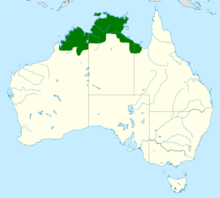| Northern rosella | |
|---|---|

| |
| Scientific classification | |
| Domain: | Eukaryota |
| Kingdom: | Animalia |
| Phylum: | Chordata |
| Class: | Aves |
| Order: | Psittaciformes |
| Family: | Psittaculidae |
| Genus: | Platycercus |
| Species: | P. venustus
|
| Binomial name | |
| Platycercus venustus (Kuhl, 1820)
| |

| |
| Range (in green) in Australia | |
The northern rosella (Platycercus venustus), formerly known as Brown's rosella or the smutty rosella, is a species of parrot native to northern Australia, ranging from the Gulf of Carpentaria and Arnhem Land to the Kimberley. It was described by Heinrich Kuhl in 1820, and two subspecies are recognised. The species is unusually coloured for a rosella, with a dark head and neck with pale cheeks—predominantly white in the subspecies from the Northern Territory and blue in the Western Australian subspecies hillii. The northern rosella's mantle and scapulars are black with fine yellow scallops, while its back, rump and underparts are pale yellow with fine black scallops. The long tail is blue-green, and the wings are black and blue-violet. The sexes have similar plumage, while females and younger birds are generally duller with occasional spots of red.
Found in woodland and open savanna country, the northern rosella is predominantly herbivorous, consuming seeds, particularly of grasses and eucalypts, as well as flowers and berries, but it may also eat insects. Nesting takes place in tree hollows. Although uncommon, the northern rosella is rated as least concern on the International Union for Conservation of Nature (IUCN)'s Red List of Threatened Species.
- ^ BirdLife International (2016). "Platycercus venustus". IUCN Red List of Threatened Species. 2016: e.T22685119A93059167. doi:10.2305/IUCN.UK.2016-3.RLTS.T22685119A93059167.en. Retrieved 12 November 2021.
